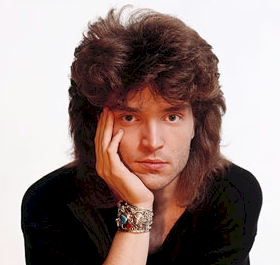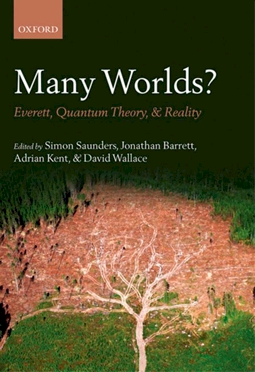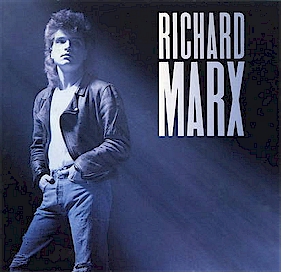 Years ago, a good friend of mine sent me a link to one of those Internet pages that, while essentially nothing more than a time-waster, treated its topic and purpose with a sense of grand importance that appealed to me. The page stated that the Number One song on the Billboard Hot 100 singles chart the week you turned 18 would be the soundtrack of your life — the song that follows you around forever, that preternaturally fits your personality, life events, changes, etc. I admit, I kinda dig that idea (though I pity the folks whose eighteenth fell during the chart reign of “You Light Up My Life”).
Years ago, a good friend of mine sent me a link to one of those Internet pages that, while essentially nothing more than a time-waster, treated its topic and purpose with a sense of grand importance that appealed to me. The page stated that the Number One song on the Billboard Hot 100 singles chart the week you turned 18 would be the soundtrack of your life — the song that follows you around forever, that preternaturally fits your personality, life events, changes, etc. I admit, I kinda dig that idea (though I pity the folks whose eighteenth fell during the chart reign of “You Light Up My Life”).
For years, I thought the top song the week of July 19, 1988 was Cheap Trick’s “The Flame,” which sorta made sense and sorta didn’t. I’m a big fan of the band, particularly of Robin Zander, its chief vocal- and focal point; I love the song (you’ll find out how much in a future column); and I did play the shit out of it in the period of its chart run. But as the soundtrack of my life? It didn’t compute, at least not since I met, wooed, and married my wife. Soundtracks are eternal; the premise of “The Flame” only fit my life for a relatively short period.
I have recently, however, discovered an error in either the input I provided the Web page or in the algorithm within the page itself. Turns out “The Flame” was the Number One song the week of July 9, 1988. The chart-topper the week of July 23 (which included the 19th) was actually Richard Marx’s power ballad “Hold on to the Nights.”
Now that makes more sense, soundtrack-wise.
 The song is about unrequited love, chances lost, hearts broken, unceasing pondering on the question, “What might have been?” It’s about the proverbial crossroads moments—what might have happened if you had made a left turn, instead of a right? There are times when I contemplate entire series of such decision points—what if I’d chosen College B instead of College A? What if I had stayed in Location X, rather than moving to Location Y? What if I had kissed her, instead of letting the opportunity slip by? What real harm would have befallen me, had I stood up for myself, rather than backing down? What if I had backed down on that other thing, rather than imposing the outcome? What might have become of us had we not broken up when we did? What if I had tried harder at achieving that thing, rather than giving up and moving on?
The song is about unrequited love, chances lost, hearts broken, unceasing pondering on the question, “What might have been?” It’s about the proverbial crossroads moments—what might have happened if you had made a left turn, instead of a right? There are times when I contemplate entire series of such decision points—what if I’d chosen College B instead of College A? What if I had stayed in Location X, rather than moving to Location Y? What if I had kissed her, instead of letting the opportunity slip by? What real harm would have befallen me, had I stood up for myself, rather than backing down? What if I had backed down on that other thing, rather than imposing the outcome? What might have become of us had we not broken up when we did? What if I had tried harder at achieving that thing, rather than giving up and moving on?
If the many-worlds interpretation of quantum mechanics is correct, alternate universes exists in which all those questions have been answered, but that’s too much to contemplate right now. I prefer the Rob Fleming approach, named after the protagonist in Nick Hornby’s High Fidelity—the guy who revisits the key relationships of his life to figure out why each of them deteriorated, and to determine what those reasons said about him as a companion, as a man, and as a human being. I’m too old for that shit, though, and the answers I’d find were I to revisit too many crossroads moments would likely prove too embarrassing; I have a low enough level of self-esteem as it is, and it would be just like me to focus too hard on times in which I’d made a total ass of myself, before choosing one direction over the other, and I’d wind up walking out in the path of a bus, or taking a handful of those over there and washing them down with a fifth of this over here, or doing something else even dumber than that.
I only got the universe I’m in, quantum mechanics be damned, and no amount of postulatin’ or theorizin’ is gonna do me much good now. Besides which, who’s to say I didn’t make all the right decisions, right?
Right?
But you know, when I’ve drained enough out of that bottle over there (no, not that one—the other one, with the Swedish label) and “Hold on to the Nights” comes on the radio, or pops up in my shuffle, or some other tortured or nostalgic soul loads it into the jukebox, those moments reappear in front of me, and I can’t help myself—I fall into the vortex of memory and regret. I find it hard to not get lost in the thought of moments like the one Marx describes in the middle eight:
Well, I think that I’ve been true to everybody else but me
And the way I feel about you makes my heart long to be free
Every time I look into your eyes I’m helplessly aware
That the someone I’ve been searching for is right there
 You do what’s right, what you think is right, what everyone tells you is right—you’re true to everyone but yourself, and in the process you miss out on something truly special, perhaps someone truly special. It’s all right there in front of you, within your reach, and you never even move to grab it. You can submerge that frustration in whatever is handy, but all it takes is the right trigger—in this case, a 20-something-year-old song—and it all comes back to stab at you again.
You do what’s right, what you think is right, what everyone tells you is right—you’re true to everyone but yourself, and in the process you miss out on something truly special, perhaps someone truly special. It’s all right there in front of you, within your reach, and you never even move to grab it. You can submerge that frustration in whatever is handy, but all it takes is the right trigger—in this case, a 20-something-year-old song—and it all comes back to stab at you again.
I’m a lucky man—I’m sure I’ve said that in other columns, and I’ll say it again in future ones. I have a wonderful wife, a great kid, a handful of friends who mean the world to me. If you’re as lucky as I am, you know what I’m talking about—there’s much to be thankful for. But we are complicated people, regardless of whether we realize or acknowledge it—somewhere inside us all lays the seeds of regret, of lost chances. None of us has gotten it right 100 percent of the time. Owning up to that side of us is healthy; it keeps us from doing something even more regretful in the moments when that regret seizes us, when the vortex opens up and pulls us in.
I don’t understand how anyone can hear “Hold on to the Nights” and not fall into the same hole. That’s why I think my buddy’s Web page was right—the Number One song 23 years ago is indeed my song, the one that I’ll carry around with me for as long as I can carry anything. I know to most people it’s a piece of fluff—a fey whimper, an annoyance. Not here. Not by a long shot.




Comments